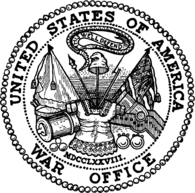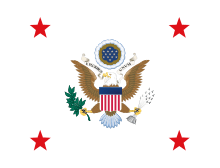United States Secretary of War
| Secretary of War of the United States of America | |
|---|---|
|
| |
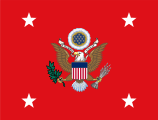 | |
| Style | The Honorable |
| Appointer |
The President with Senate advice and consent |
| Precursor | Secretary at War |
| Formation | 1789 |
| Abolished | 1947 |
| Succession |
Secretary of Defense Secretary of the Army Secretary of the Air Force |
The Secretary of War was a member of the United States President's Cabinet, beginning with George Washington's administration. A similar position, called either "Secretary at War" or "Secretary of War," had been appointed to serve the Congress of the Confederation under the Articles of Confederation between 1781 and 1789. Benjamin Lincoln and later Henry Knox held the position. When Washington was inaugurated as the first president under the Constitution, he appointed Knox to continue serving.
The Secretary of War was the head of the War Department. At first, he was responsible for all military affairs, including naval affairs. In 1798, the Secretary of the Navy was created by statute, and the scope of responsibility for this office was reduced to the affairs of the United States Army. From 1886 onward, the Secretary of War was third in the line of succession to the presidency, after the Vice President of the United States and the Secretary of State.
In 1947, with the passing of the National Security Act of 1947, the Secretary of War was replaced by the Secretary of the Army and the Secretary of the Air Force, which, along with the Secretary of the Navy, have since 1949 been non-Cabinet subordinates under the Secretary of Defense. The Secretary of the Army's office is generally considered the direct successor to the Secretary of War's office although the Secretary of Defense took the Secretary of War's position in the Cabinet, and the line of succession to the presidency.
List of Secretaries
Secretary at War (1781–1789)
The office of Secretary at War was modelled upon Great Britain's Secretary at War, who was William Barrington, 2nd Viscount Barrington, at the time of the American Revolution. By 1776, the position of the British Secretary at War was a sophisticated managerial role, but the duties in 1661 to 1666 of England's first Secretary at War, Sir William Clarke, were more basic ones of literally handling the secretarial duties of managing official correspondence, memoranda, military orders, and financial accounts. The Secretary was appointed by and answered the Congress alone. The office of Secretary at War replaced the Board of War, and like the President of the Board, the Secretary wore no special insignia. The Inspector General, Quartermaster General, Commissary General, and Adjutant General severed on the Secretary's staff, however the Army it's self under Secretary Henry Knox only consisted of 700 men.
| No. | Portrait | Name | State of residence | Took office | Left office | Congress |
|---|---|---|---|---|---|---|
| 1 |  | Benjamin Lincoln | Massachusetts | 1781 | 1783 | Congress of the Confederation |
| 2 |  | Henry Knox | Massachusetts | March 8, 1785 | September 12, 1789 |
Secretary of War (1789–1947)

- Parties
No party Federalist Democratic-Republican Democratic Whig Republican
| No. | Portrait | Name | State of residence | Took office | Left office | President(s) | |
|---|---|---|---|---|---|---|---|
| 1 |  | Henry Knox | Massachusetts | September 12, 1789 | December 31, 1794 | George Washington | |
| 2 |  | Timothy Pickering | Pennsylvania[1] | January 2, 1795 | December 10, 1795 | ||
| 3 |  | James McHenry | Maryland | January 27, 1796 | June 1, 1800[2] | ||
| John Adams | |||||||
| 4 | 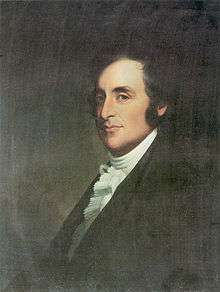 | Samuel Dexter | Massachusetts | June 1, 1800 | January 31, 1801 | ||
| 5 |  | Henry Dearborn | Massachusetts | March 5, 1801 | March 4, 1809 | Thomas Jefferson | |
| 6 | 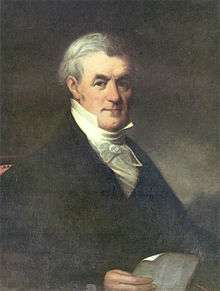 | William Eustis | Massachusetts | March 7, 1809 | January 13, 1813 | James Madison | |
| 7 |  | John Armstrong, Jr. | New York | January 13, 1813 | September 27, 1814 | ||
| 8 |  | James Monroe | Virginia | September 27, 1814 | March 2, 1815 | ||
| 9 | 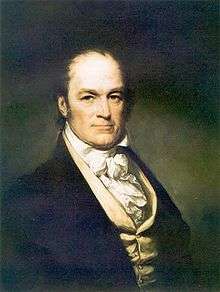 | William H. Crawford | Georgia | August 1, 1815 | October 22, 1816 | ||
| 10 |  | John C. Calhoun | South Carolina | October 8, 1817 | March 4, 1825 | James Monroe | |
| 11 | 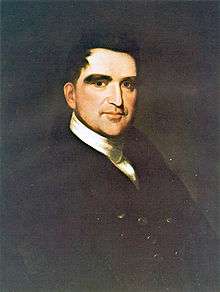 | James Barbour | Virginia | March 7, 1825 | May 23, 1828 | John Quincy Adams | |
| 12 |  | Peter Buell Porter | New York | May 23, 1828 | March 9, 1829 | ||
| 13 |  | John H. Eaton | Tennessee | March 9, 1829 | June 18, 1831 | Andrew Jackson | |
| 14 |  | Lewis Cass | Ohio | August 1, 1831 | October 5, 1836 | ||
| 15 |  | Joel Roberts Poinsett | South Carolina | March 7, 1837 | March 4, 1841 | Martin Van Buren | |
| 16 |  | John Bell | Tennessee | March 5, 1841 | September 13, 1841 | William Henry Harrison | |
| John Tyler | |||||||
| 17 |  | John Canfield Spencer | New York | October 12, 1841 | March 4, 1843 | ||
| 18 |  | James Madison Porter | Pennsylvania | March 8, 1843 | February 14, 1844 | ||
| 19 | 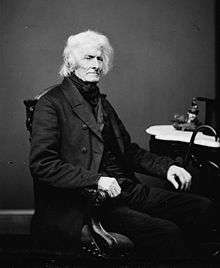 | William Wilkins | Pennsylvania | February 15, 1844 | March 4, 1845 | ||
| 20 |  | William Learned Marcy | New York | March 6, 1845 | March 4, 1849 | James K. Polk | |
| 21 |  | George W. Crawford | Georgia | March 8, 1849 | July 22, 1850 | Zachary Taylor | |
| 22 | 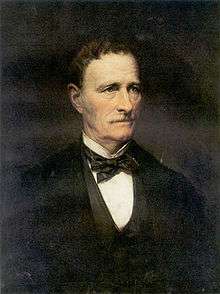 | Charles Magill Conrad | Louisiana | August 15, 1850 | March 4, 1853 | Millard Fillmore | |
| 23 |  | Jefferson Davis | Mississippi | March 7, 1853 | March 4, 1857 | Franklin Pierce | |
| 24 | 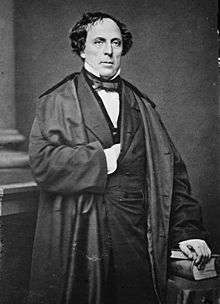 | John B. Floyd | Virginia | March 6, 1857 | December 29, 1860 | James Buchanan | |
| 25 |  | Joseph Holt | Kentucky | January 18, 1861 | March 4, 1861 | ||
| 26 |  | Simon Cameron | Pennsylvania | March 5, 1861 | January 14, 1862 | Abraham Lincoln | |
| 27 |  | Edwin M. Stanton | Pennsylvania | January 20, 1862 | May 28, 1868 | ||
| Andrew Johnson | |||||||
| 28 | 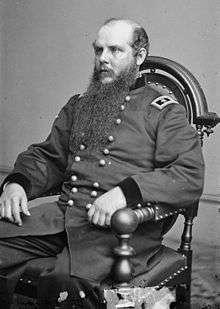 | John McAllister Schofield | Illinois | June 1, 1868 | March 13, 1869 | ||
| 29 |  | John Aaron Rawlins | Illinois | March 13, 1869 | September 6, 1869 | Ulysses S. Grant | |
| 30 |  | William W. Belknap | Iowa | October 25, 1869 | March 2, 1876 | ||
| 31 |  | Alphonso Taft | Ohio | March 8, 1876 | May 22, 1876 | ||
| 32 |  | J. Donald Cameron | Pennsylvania | May 22, 1876 | March 4, 1877 | ||
| 33 |  | George W. McCrary | Iowa | March 12, 1877 | December 10, 1879 | Rutherford B. Hayes | |
| 34 | 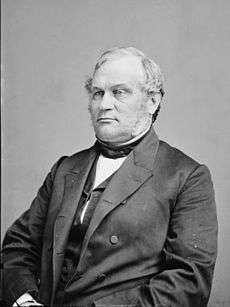 | Alexander Ramsey | Minnesota | December 10, 1879 | March 4, 1881 | ||
| 35 |  | Robert Todd Lincoln | Illinois | March 5, 1881 | March 4, 1885 | James A. Garfield | |
| Chester A. Arthur | |||||||
| 36 |  | William Crowninshield Endicott | Massachusetts | March 5, 1885 | March 4, 1889 | Grover Cleveland | |
| 37 |  | Redfield Proctor | Vermont | March 5, 1889 | November 5, 1891 | Benjamin Harrison | |
| 38 |  | Stephen Benton Elkins | West Virginia | December 17, 1891 | March 4, 1893 | ||
| 39 | 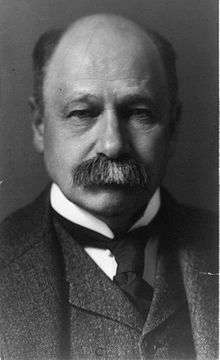 | Daniel S. Lamont | New York | March 5, 1893 | March 4, 1897 | Grover Cleveland | |
| 40 |  | Russell A. Alger | Michigan | March 5, 1897 | August 1, 1899 | William McKinley | |
| 41 | 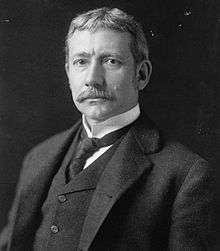 | Elihu Root | New York | August 1, 1899 | January 31, 1904 | ||
| Theodore Roosevelt | |||||||
| 42 | 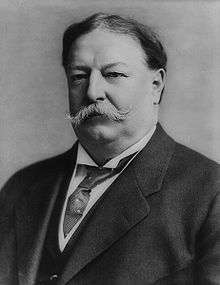 | William Howard Taft | Ohio | February 1, 1904 | June 30, 1908 | ||
| 43 |  | Luke Edward Wright | Tennessee | July 1, 1908 | March 4, 1909 | ||
| 44 |  | Jacob M. Dickinson | Tennessee | March 12, 1909 | May 21, 1911 | William Howard Taft | |
| 45 |  | Henry L. Stimson | New York | May 22, 1911 | March 4, 1913 | ||
| 46 |  | Lindley Miller Garrison | New Jersey | March 5, 1913 | February 10, 1916 | Woodrow Wilson | |
| 47 |  | Newton D. Baker | Ohio | March 9, 1916 | March 4, 1921 | ||
| 48 |  | John W. Weeks | Massachusetts | March 5, 1921 | October 13, 1925 | Warren G. Harding | |
| Calvin Coolidge | |||||||
| 49 |  | Dwight F. Davis | Missouri | October 14, 1925 | March 4, 1929 | ||
| 50 |  | James William Good | Illinois | March 6, 1929 | November 18, 1929 | Herbert Hoover | |
| 51 | 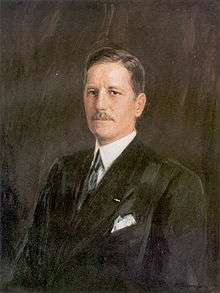 | Patrick J. Hurley | Oklahoma | December 9, 1929 | March 4, 1933 | ||
| 52 |  | George Dern | Utah | March 4, 1933 | August 27, 1936 | Franklin D. Roosevelt | |
| 53 |  | Harry Hines Woodring | Kansas | September 25, 1936 | June 20, 1940 | ||
| 54 |  | Henry L. Stimson | New York | July 10, 1940 | September 21, 1945 | ||
| Harry S. Truman | |||||||
| 55 |  | Robert P. Patterson | New York | September 27, 1945 | July 18, 1947 | ||
| 56 | 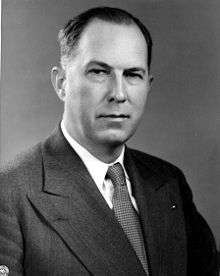 | North Carolina | July 19, 1947 | September 18, 1947 | |||
See also
References
Footnotes
- ↑ http://memory.loc.gov/cgi-bin/query/D?hlaw:7:./temp/~ammem_WqlO::
- ↑ "Papers of the War Department". Wardepartmentpapers.org. Retrieved 2012-05-15.
Further reading
- Bell, William Gardner (2005). Commanding Generals and Chiefs of Staff 1775-2005: Portraits and Biographical Sketches. Washington, D.C.: United States Army Center of Military History.
- Grossman, Mark (2010). Encyclopedia of the United States Cabinet 1789-2010. Armenia, New York: Greyhouse Publishing.
- King, Archibald (1960) [1949]. Command of the Army (PDF). Military Affairs. Charlottesville, Virginia: The Judge Advocate General's School, U.S. Army.
